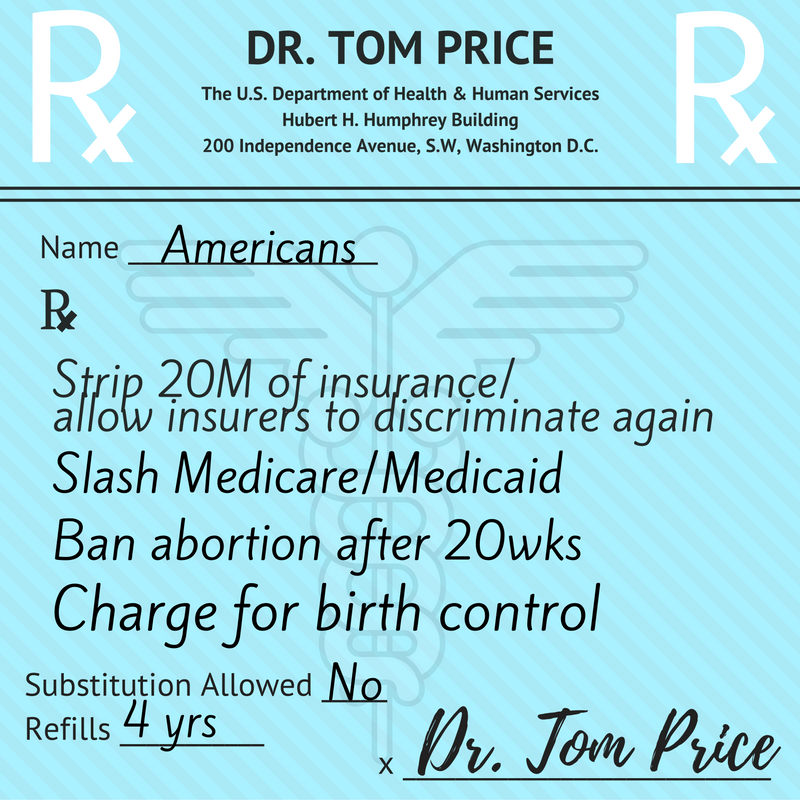Tom Price, nominee for Secretary of Health and Human Services, is a 3 out of 5 on the Swamp-O-Meter. He’s been an establishment politician for nearly 20 years, is a multi-millionaire, and believes that not a single woman needs assistance accessing contraception. It’s getting swampy in here!
7 reasons Tom Price’s nomination for Secretary of Health and Human Services would con the very people Trump promised to help
1. Tom Price’s idea of replacing the ACA would hike up prices & cut benefits for the most vulnerable. Oh yeah, he’s also anti-Medicare. [TWEET THIS]
Rep. Price hates the Affordable Care Act. Like really hates it. He supported shutting down the government over Obamacare; referred to it as tyranny before the ACA even became a law; and said it undermined “freedom and liberty” and would turn doctors into slaves.
If the Affordable Care Act were to be repealed today, more than 22 million people would lose health coverage. And yet, year after year, Rep. Price (R-GA) has introduced an unwieldy replacement for the ACA that would increase costs and cut benefits for older and sicker Americans — those who depend on health insurance the most. While canceling financial and health security for lower-income Americans, he would expand Health Savings Accounts, tax shelters for the wealthy.
Rep. Price doesn’t seem to care that in Georgia 587,845 consumers enrolled or chose quality, affordable health insurance coverage through the Marketplace. According to the U.S. Department of Health and Human Services, thanks to the Affordable Care Act, “76 million Americans with private health insurance gained preventive service coverage with no cost-sharing, including 2,358,000 in Georgia.”
2. Worse idea ever: Price would allow insurance companies to discriminate against people with pre-existing conditions. [TWEET THIS]
When Republicans were trying (again) to repeal the Affordable Care Act in 2012, Rep. Price led the troops with a replacement bill that would not require insurance companies to accept people with pre-existing conditions if they had any gap in coverage. When asked why he omitted that provision, Price said that guaranteeing access to coverage for people with pre-existing conditions was “a terrible idea.”
And yet, it’s one of the most popular provisions across the aisle and across the country.
3. Remember when Tom Price said there’s not one woman who has been left behind from having access to contraceptives? Yeah, he said that. [TWEET THIS]
In a 2012 interview with Think Progress, Rep. Price was asked what would happen to the women who would be left behind if President Obama’s contraceptive coverage rule were to be rescinded. Price’s response: “Bring me one woman who has been left behind. Bring me one. There’s not one.”
4. Shocker: Tom Price has voted to defund Planned Parenthood. [TWEET THIS]
Rep. Price has consistently voted to defund Planned Parenthood. Last year, when the House voted to cut federal funding for the organization Price had this to say: “This effort is not about party ideology; it is about common, human decency and who we are as a people.” Price is avidly anti-abortion: He has received a 0 percent on Planned Parenthood’s annual scorecard and a 100 percent on National Right to Life’s annual scorecard. And, like many of his GOP colleagues, he ignores the fact that 90 percent of Planned Parenthood’s activity is preventative care, including lifesaving cancer screenings, birth control, and more.
5. Tom Price’s idea of a health care plan? Privatize Medicare and cut funding for Medicaid. [TWEET THIS]
In addition to wanting to eliminate protections for people with pre-existing conditions, charge women for birth control, and repeal the Affordable Care Act, Rep. Price also supports hugely damaging changes to Medicare and Medicaid — programs that cover nearly one in three Americans. If Price had his way, both programs would stop being entitlements required to provide coverage to everyone who qualifies for them.
Rep. Price, like many of his GOP colleagues, supports block granting Medicaid, which would shift control of the program to states while massively cutting federal funding for it. But giving states more control over the program would allow them much more room to change eligibility rules and medical services that must be provided under the program. Combined with the funding cuts, this would eventually result in major funding cuts and lead to millions of beneficiaries losing coverage.
For Medicare, Price, again like many of his GOP colleagues, supports privatization of the program through vouchers that would be capped, regardless of the actual cost of a plan. This scheme would transfer costs to many seniors and come as a shock to Trump supporters who listened when he promised he wouldn’t cut their Medicare benefits.

6. The Affordable Care Act isn’t the only thing Rep. Price doesn’t believe in. He’s also a climate denier. [TWEET THIS]
Price once told the Republican Study Committee that climate change “goes against all common sense, especially considering the many recent revelations of errors and obfuscation in the allegedly ‘settled science’ of global warming.” Ninety-seven percent of scientists would disagree with him. And given the enormous public health threats posed by climate change, this should be concerning.
7. Price doesn’t believe in marriage equality and his plans to repeal the ACA would directly harm LGBT people. [TWEET THIS]
Rep. Price has a terrible record when it comes to rights for LGBT people. He called the Supreme Court decision on marriage equality a “sad day for marriage” and, while in Congress, has sponsored Constitutional Amendments to define marriage as between one man and one woman. And during his time as Georgia Senate Majority Leader, he ushered through a Constitutional Amendment to ban same-sex marriage.
Price’s opposition of the Affordable Care Act would have devastating consequences for the LGBT community. The nondiscrimination provisions of the ACA explicitly protect LGBT people from discrimination and the law has helped drastically reduce the uninsured rate among the community. Since LGBT people are more likely to lack health insurance coverage compared to non-LGBT people and face health disparities and barriers to quality care that the ACA works to address, Price’s appointment could have severe, negative consequences for the health of LGBT people nationwide.
8. Tom Price’s plan to repeal the ACA would cut tax credits for over 6 million people in the states Trump won. [TWEET THIS]
People living in Republican-led states — the states that Trump won — stand to lose the most from Tom Price’s plan to repeal the Affordable Care Act. Three million people living in red states are currently receiving tax credits through the ACA to help afford their health insurance, according to new data from The Kaiser Family Foundation. If you expand the list to include swing states that Trump won — like Florida and Pennsylvania — that number grows to 6 million people. The ACA tax credits are meant to help low- or moderate-income people afford monthly payments for health insurance plans and a repeal of the law would eliminate these subsidies, and likely make health insurance unaffordable for millions of people.
How you can #ResistPrice
The Secretary of Health and Human Services must be confirmed by a majority of the Senate Finance Committee and a majority vote on the floor of the Senate. Several members of the Senate Finance Committee, including Sen. Mike Enzi (R-WY), Sen. Johnny Isakson (R-GA), and Sen. Pat Toomey (R-PA) have already shown support for Price before even scheduling hearings or submitting any questions for the nominee.

Call, write, tweet Orrin Hatch (202–224–5251), Chuck Grassley (202–224–3744), Mike Crapo (202–224–6142), Pat Roberts (202–224–4774), Michael B. Enzi (202–224–3424), John Cornyn (202–224–2934), John Thune (202–224–2321), Richard Burr (202–224–3154), Johnny Isakson (202–224–3643), Rob Portman (202–224–3353), Pat Toomey (202–224–4254), Dan Coats (202–224–5623), Dean Heller (202–224–6244), and Tim Scott (202–224–6121) of the Senate Finance Committee and demand that they stand up against the grave threat that Price poses to national public health.
Did we mention that Rep. Price hates the Affordable Care Act? He does. And that’s been well-documented. But the ACA isn’t the only thing at stake with Price in charge of the Department of Health and Human Services. Rep. Price is also one of Medicare’s biggest enemies.
Price, who celebrated the 44th anniversary of Medicare by saying, “nothing has had a greater negative effect on the delivery of health care than the federal government’s intrusion into medicine through Medicare,” has spent his career attacking Medicare and he doesn’t plan on stopping now. He is reportedly hoping to overhaul Medicare “within the first six to eight months” of the Trump administration. He’s planning to do it through a process called budget reconciliation — the same process GOP lawmakers plan on using to pass ACA repeal — which would allow major policy changes like this to pass without securing a filibuster-proof 60 votes.
Price hasn’t specified what, exactly, his Medicare overhaul would entail, but privatization of Medicare has long been a priority for conservative lawmakers. This could look like Paul Ryan’s idea of “premium support,” which would effectively change the current Medicare system — under which the government pays hospitals, doctors, and other health care providers directly — to one where Medicare enrollees would each get a check to buy their own insurance on a private market. This kind of change would take power away from Medicare enrollees and give it to private insurers. And the consequences could be grave: previous similar proposals would cut the program to cover fewer people, offer enrollees fewer benefits, and open the door to charging much higher premiums to the people facing the most serious health challenges.
We’ll have to wait for a more specific proposal from Price, but what is clear is that Trump seems primed to break campaign promises like this: “I’m not going to cut Social Security like every other Republican and I’m not going to cut Medicare or Medicaid.”
More on Price’s threat to Medicare here and why the last 50 years of health reform are on the chopping block here.